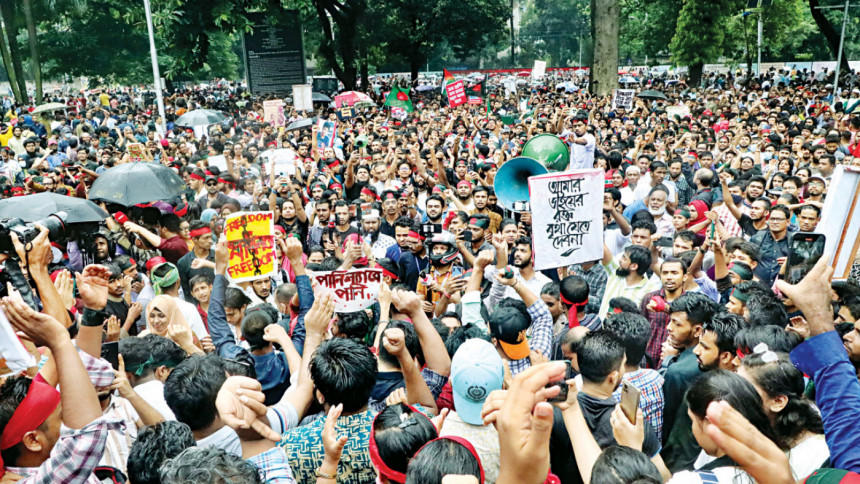Empowering Youth for Inclusive Governance and Sustainable Development in Bangladesh
Youth leading the way to good governance in Bangladesh
October 16, 2024

By Stefan Liller, Resident Representative of UNDP Bangladesh.
The Op-Ed was first published in The Daily Star. Click here to read the original publication.
Youth have been at the forefront of many global movements, fighting injustice and calling for democratic reforms. We are seeing something similar in Bangladesh. Young people have been at the centre of a major political transition. What started as a protest movement against public sector job quotas evolved into a mass public movement. After weeks of unrest that sadly saw hundreds of deaths and thousands injured, there is now a growing sense of optimism that Bangladesh has an opportunity to address systemic and structural issues of governance, rule of law, and human rights.
The changes that the youth of Bangladesh are shaping are complex, and the task ahead is not easy. This includes building a discrimination-free Bangladesh, where everyone benefits and enjoys the fruits of socio-economic prosperity. The role of youth in civic and political life has never been more critical. Bangladesh's youth are agents of change. Their engagement is essential to uphold democratic values and ensuring that future development is underpinned by equity, non-discrimination, and social justice. Now is the time to harness the energy and creativity of Generation Z and ensure that Bangladesh fulfils its enormous potential.
But how do we harness the energy and creativity that youth brings?
First and foremost, the interface between policymakers and youth must be strengthened. Inclusive and meaningful dialogue mechanisms at all levels of policymaking are needed so the voices of young people can be considered. This must be institutionalised so that engagement with youth is not an afterthought or done for optics. While many governments globally desire to engage with young people, good intentions have often just led to occasional dialogues with selected youth groups.
Second, the interface must be broadened to engage young people who remain underrepresented, such as youth from remote rural areas, young women, persons with disabilities, religious minorities, gender and sexual minorities, and those from ethnic minority communities. Without a conscious effort to bring unheard voices to influence change, the status quo will continue.
Third, building the capabilities of youth is important so they can better articulate and influence policies. Civic and voter education, as well as promoting active citizenship, are critical for nurturing these capabilities.
While it will take time, starting now is crucial to build the foundations of inclusive and people-centred governance in which young people have a greater stake in Bangladesh's development. Responsible citizenship also demands a commitment to peace, tolerance, and dialogue. By advancing a culture of accountable and informed civic engagement, youth can drive transformative change.
Lastly, Bangladesh must find a lasting solution to create decent employment. There is a collective sense among many Bangladeshis that the country has recorded impressive economic growth, while this growth has not fully benefitted everyone. Although the national unemployment rate remains relatively low, it conceals joblessness among young people. At more than 11 percent, youth unemployment is high, but millions of young people are also outside the labour force and not studying or receiving training. Widespread informality, accounting for nearly 85 percent of jobs, makes it even harder to earn a decent living and discourages people from seeking employment.
Unlike many low-middle economies, Bangladesh has carved a place in the global manufacturing supply chains. Unfortunately, manufacturing has remained concentrated in the readymade garments sector, not producing enough positive spillovers for other economic sectors. Part of the challenge is that Bangladesh has struggled to attract sufficient private investment. There are also weak backward and forward linkages with small enterprises, stunting their growth and ability to create jobs.
Bangladesh now has an opportunity to invest in building the skills and competencies that young people need for a dynamic labour market. In a globalised world, where rapid technological changes are threatening jobs that entail routine tasks, the future lies in knowledge and green jobs, as well as jobs requiring critical thinking and advanced skills. Limited diversification and low levels of human capital have been at the crux of jobless growth in Bangladesh.
There are no quick fixes for the challenges outlined above, but they are not impossible to tackle when there is political will and a broad consensus for change. This is the moment for Bangladesh to write a new social contract between the state and its people, where youth are architects of building the future they want to see. As a trusted partner of Bangladesh, UNDP is offering all the support we can to help shape Bangladesh 2.0.
Bangladesh's youth are the key to a future of equity and growth. By amplifying their voices, fostering dialogue, and investing in skills, we can build a more inclusive and prosperous nation.

 Locations
Locations


